Team chosen to be first to make oxygen on the moon
Wednesday, 09 March 2022 14:05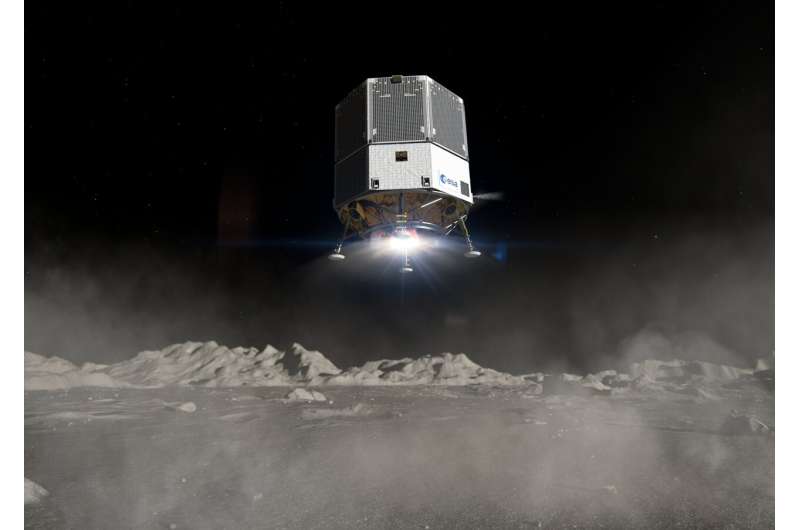
How to talk to extraterrestrials
Wednesday, 09 March 2022 14:04
In Steven Spielberg's 1977 film "Close Encounters of the Third Kind," extraterrestrials communicate with humans through a catchy five-note sequence. In Spielberg's 1982 blockbuster "E.T.," a diminutive alien learns basic English from a children's TV show. More recently, in 2016's "Arrival," squid-like visitors use pictograms to make themselves understood to American scientists wielding whiteboards with words.
Finding moons' hidden oceans with induced magnetic fields
Wednesday, 09 March 2022 13:49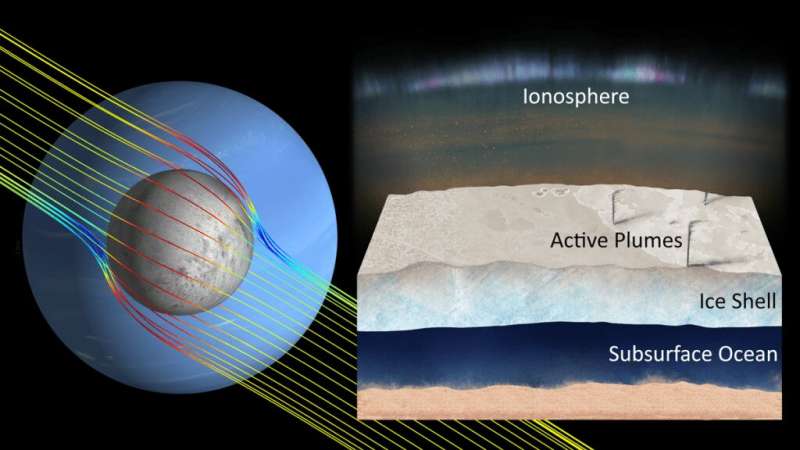
In the 21st century, planetary scientists have become increasingly aware that subsurface oceans consisting of liquid water exist within objects throughout the solar system. Because water is a universal requirement for life on Earth, these bodies—mostly moons—are enticing targets in the search for extraterrestrial life.
A primary way of deducing the existence of an unseen ocean is through an induced magnetic field. These fields originate from a unique application of Faraday's law of induction, which states that a time-varying magnetic field creates an electric current when applied to a circuit. Water that is salty enough to remain liquid in cold space environments is very conductive; at the same time, a moon's orbit through a planet's rotating magnetic field exposes the moon to a field strength that varies with time.
Canada answers Ukraine’s call for satellite radar imagery
Wednesday, 09 March 2022 13:45
Canada’s MDA Corp. will provide satellite radar imagery to Ukraine’s government to help it counter Russia’s invasion of that country. Canadian government sources say that RADARSAT-2 will be used to collect the data.
The post Canada answers Ukraine’s call for satellite radar imagery appeared first on SpaceNews.
Filling the GOCE data gap unearths South Pole’s geological past
Wednesday, 09 March 2022 13:45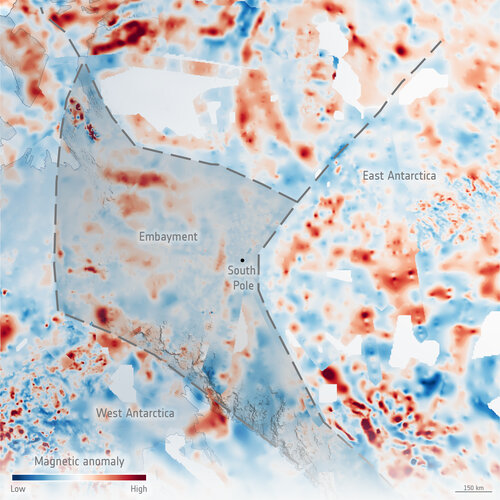
It’s very difficult to know what lies beneath a blanket of kilometres-thick ice, so it is hardly surprising that scientists have long contested the shape and geology of the ancient supercontinent from which East Antarctica formed over a billion years ago. An ESA-funded study can now lay some of this conjecture to rest. Using sensors on aircraft to measure changes in the gravity and magnetic signatures of the different rocks under the ice, scientists have discovered a huge bay the size of the UK formed part of the edge of
Omnibus spending bill includes $24 billion for NASA for 2022
Wednesday, 09 March 2022 11:35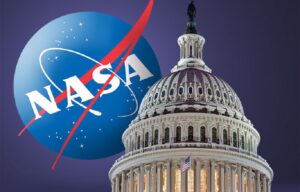
House and Senate appropriators completed work March 9 on an omnibus spending bill for fiscal year 2022 that would give NASA a little more than $24 billion, $760 million below the administration’s request.
The post Omnibus spending bill includes $24 billion for NASA for 2022 appeared first on SpaceNews.
There's a big rock stuck inside one of Perseverance's wheels
Wednesday, 09 March 2022 10:59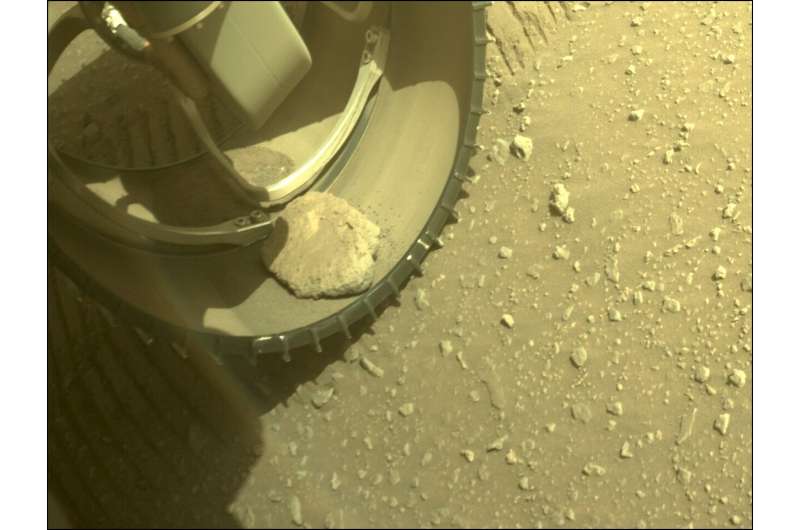
It looks like the Perseverance rover has an unwanted passenger, a rock stuck inside one of its wheels. The image of the stone was selected by public input as the "Image of the Week" for Week 54 (Feb. 20–26, 2022) of the Perseverance mission. Perseverance captured this image on February 25, 2022.
The rover's Front Left Hazard Avoidance Camera A captured the image. When the rover is driving, it makes periodic stops to let the Hazard Cameras survey the immediate surroundings. The Hazard Cameras help evaluate the hazards in front of and behind the rover, like large boulders, deep trenches, or dunes. The cameras create 3D views of the surroundings that help the rover make its own decisions without consulting with the rover team on Earth on every move.
The rock's been there for a few days, based on images from March 2. It's difficult to tell from the picture for sure, but it doesn't appear to be wedged in. Will it fall out during normal operations?
The rock doesn't appear to be causing any damage or hindering the rover's operations.
Rocket Lab begins qualification of highest performing space solar cell technology
Wednesday, 09 March 2022 08:43 Rocket Lab USA, Inc. reports that its next-generation solar cell technology is transitioning into qualification. The cell is the next product from SolAero's patented Inverted MetaMorphic (IMM) solar cell technology, dubbed IMM-ss, that is expected to exhibit a conversion efficiency of ~33.3% in volume production. IMM-ss is the 4th generation IMM product created by SolAero Technologies Inc. (SolA
Rocket Lab USA, Inc. reports that its next-generation solar cell technology is transitioning into qualification. The cell is the next product from SolAero's patented Inverted MetaMorphic (IMM) solar cell technology, dubbed IMM-ss, that is expected to exhibit a conversion efficiency of ~33.3% in volume production. IMM-ss is the 4th generation IMM product created by SolAero Technologies Inc. (SolA SpaceX plans another Starlink launch as Ukraine uses the service during conflict
Wednesday, 09 March 2022 08:43 SpaceX plans to launch more Starlink communications satellites from Florida on Wednesday as the Ukrainian government uses the service during its defense against the Russian invasion.
The use of satellite communications by defenders in a conflict, where ground communications may be destroyed at any moment, can make a big difference in the outcome, John Scott Railton of the University of
SpaceX plans to launch more Starlink communications satellites from Florida on Wednesday as the Ukrainian government uses the service during its defense against the Russian invasion.
The use of satellite communications by defenders in a conflict, where ground communications may be destroyed at any moment, can make a big difference in the outcome, John Scott Railton of the University of Iran says puts new military satellite in orbit
Wednesday, 09 March 2022 08:43 Iran announced Tuesday it had successfully placed a military satellite in orbit, as talks on reviving a 2015 nuclear deal between Tehran and major powers reach a critical stage.
"Iran's second military satellite - named Nour-2 - has been launched into space by the Qassed rocket of the aerospace wing of the Revolutionary Guards and successfully placed in orbit 500 kilometres (310 miles) a
Iran announced Tuesday it had successfully placed a military satellite in orbit, as talks on reviving a 2015 nuclear deal between Tehran and major powers reach a critical stage.
"Iran's second military satellite - named Nour-2 - has been launched into space by the Qassed rocket of the aerospace wing of the Revolutionary Guards and successfully placed in orbit 500 kilometres (310 miles) a NASA to share tools, resources at upcoming agriculture conference
Wednesday, 09 March 2022 08:43 NASA will participate in the 2022 Commodity Classic conference, America's largest farmer-led, farmer-focused educational and agricultural experience.
Agency representatives will discuss information, tools, and resources, drawn from the NASA's Earth observation satellites and science research. Farmers and others regularly make decisions about water management, planting, and market decisions
NASA will participate in the 2022 Commodity Classic conference, America's largest farmer-led, farmer-focused educational and agricultural experience.
Agency representatives will discuss information, tools, and resources, drawn from the NASA's Earth observation satellites and science research. Farmers and others regularly make decisions about water management, planting, and market decisions Confessions of a former fireball - how Earth became habitable
Wednesday, 09 March 2022 08:43 Researchers at Yale and Caltech have a bold new theory to explain how Earth transformed itself from a fiery, carbon-clouded ball of rocks into a planet capable of sustaining life.
The theory covers Earth's earliest years and involves "weird" rocks that interacted with seawater in just the right way to nudge biological matter into existence.
"This period is the most enigmatic time in
Researchers at Yale and Caltech have a bold new theory to explain how Earth transformed itself from a fiery, carbon-clouded ball of rocks into a planet capable of sustaining life.
The theory covers Earth's earliest years and involves "weird" rocks that interacted with seawater in just the right way to nudge biological matter into existence.
"This period is the most enigmatic time in NASA's Angie Jackman works to develop rocket that will bring Mars samples to Earth
Wednesday, 09 March 2022 08:43 Huntsville AL (SPX) Mar 09, 2022
Right now, some 182 million miles separate the red clay of Alabama from the dusty red planet Mars. But groundbreaking flight hardware developed at NASA's Marshall Space Flight Center in Huntsville, Alabama, will soon close that distance.
The new hardware is an integral component of the Mars Sample Return campaign, a historic endeavor that will, for the fir
Huntsville AL (SPX) Mar 09, 2022
Right now, some 182 million miles separate the red clay of Alabama from the dusty red planet Mars. But groundbreaking flight hardware developed at NASA's Marshall Space Flight Center in Huntsville, Alabama, will soon close that distance.
The new hardware is an integral component of the Mars Sample Return campaign, a historic endeavor that will, for the fir Blowing dust to cool fusion plasmas
Wednesday, 09 March 2022 08:43 Future tokamak fusion power reactors will generate heat beyond what current materials can withstand. Scientists have proposed various methods for cooling the edge of the magnetically confined fusion fuel, or plasma, to protect the walls of the surrounding tokamak. One approach is injecting impurities in the form of gases to help radiate away excess heat. However, there is a limited range of gase
Future tokamak fusion power reactors will generate heat beyond what current materials can withstand. Scientists have proposed various methods for cooling the edge of the magnetically confined fusion fuel, or plasma, to protect the walls of the surrounding tokamak. One approach is injecting impurities in the form of gases to help radiate away excess heat. However, there is a limited range of gase Dark energy: Neutron stars will tell us if it's only an illusion
Wednesday, 09 March 2022 08:43 A huge amount of mysterious dark energy is necessary to explain cosmological phenomena, such as the accelerated expansion of the Universe, with Einstein's theory. But what if dark energy was just an illusion and general relativity itself had to be modified? A new SISSA study, published in Physical Review Letters, offers a new approach to answer this question.
Thanks to huge computational a
A huge amount of mysterious dark energy is necessary to explain cosmological phenomena, such as the accelerated expansion of the Universe, with Einstein's theory. But what if dark energy was just an illusion and general relativity itself had to be modified? A new SISSA study, published in Physical Review Letters, offers a new approach to answer this question.
Thanks to huge computational a 